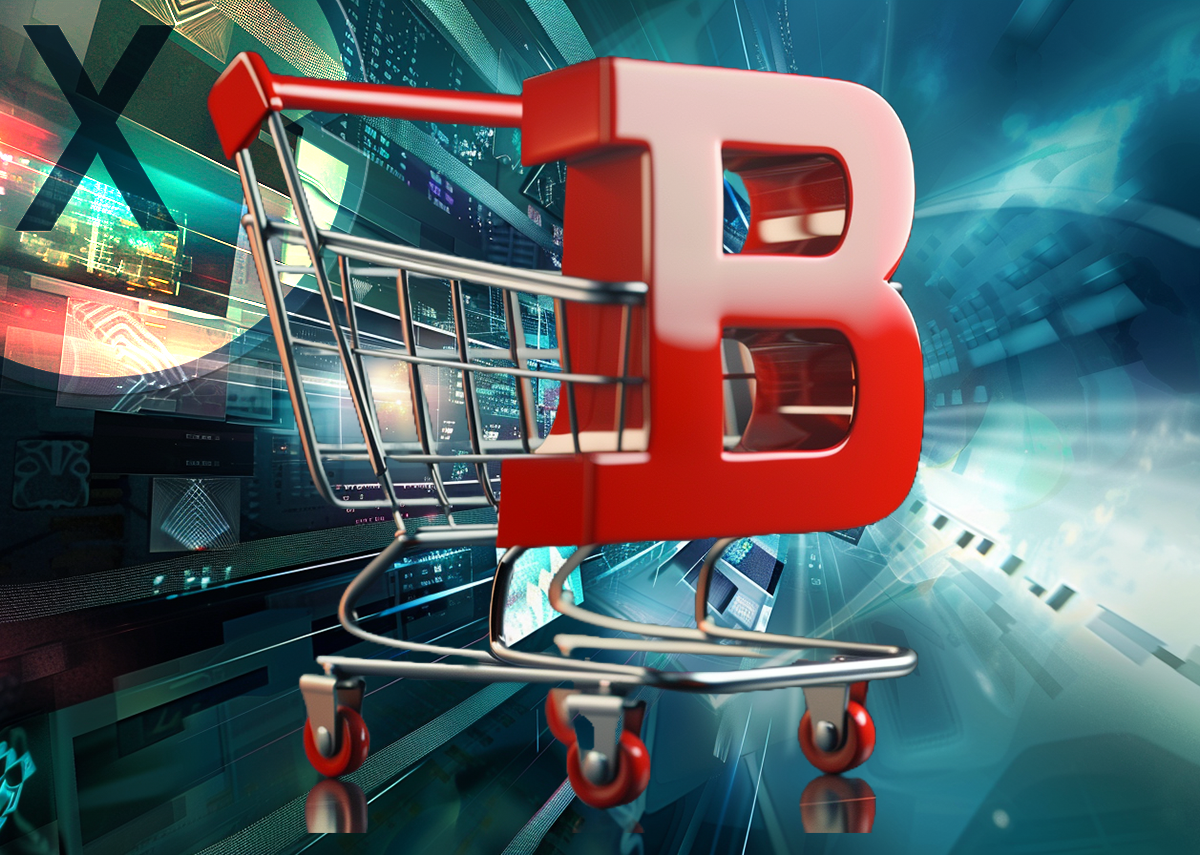B2C & B2B Commerce: Digital trading platforms – e-commerce, v-commerce, digital shopping systems and shop platforms
Language selection 📢
Published on: March 29, 2024 / Update from: March 29, 2024 - Author: Konrad Wolfenstein
🚀 Digital platforms: The heart of the modern retail landscape
🛍️ B2C trading platforms
B2C trading platforms are aimed directly at the end consumer. Examples of this are well-known online marketplaces and retailers such as Amazon, eBay or Zalando, which sell products and services to individual customers. These platforms are designed to reach a wide audience with a wide range of products. A key feature of B2C platforms is user-friendliness: the user interfaces are easy to navigate, the product displays are attractively designed and the ordering and payment process is kept as smooth as possible.
One of the biggest offerings of B2C platforms is personalization of the shopping experience. By using data collection and analysis, these platforms can provide customized recommendations based on previous searches and purchases. This means the shopping experience for consumers is becoming increasingly personalized and convenient.
🏢 B2B trading platforms
In contrast, B2B platforms focus on trade between companies. Examples of this would be Alibaba or ThomasNet. These platforms are used to trade goods in larger quantities, which often involves more complex transaction processes, including individual price negotiations, requests for quotations and long-term contractual agreements. The features these platforms provide are tailored to the specific needs of business relationships and often offer more advanced tools for order processing, inventory management, and integration with other business systems.
While B2C platforms are designed to appeal to the widest possible audience, B2B platforms focus on creating and deepening long-term business relationships. The interaction processes are designed less for speed or immediate transactions, but rather for the establishment of a stable, trusting trading context.
🌐 E-commerce
At its core, e-commerce refers to the buying and selling of goods and services over the Internet. It is the foundation on which both B2C and B2B platforms operate. E-commerce has continued to evolve, offering an increasingly diversified range of products and a growing number of services.
What makes e-commerce particularly attractive is the ability to conduct business anytime, anywhere. Customers can search, compare and purchase products worldwide - giving them access to an unprecedented variety of goods. For companies, e-commerce means the opportunity to reach a global customer base, which in turn leads to an expansion of market potential.
Suitable for:
🕶️ V-Commerce
The evolution of e-commerce is V-Commerce (Virtual Commerce), which includes virtual reality and augmented reality to create an immersive shopping experience. Brands and retailers use v-commerce, for example, to give customers the opportunity to virtually try on items of clothing or visualize the placement of a piece of furniture in their living space. It enables an interactive experience that blurs the boundaries between the physical and digital worlds.
Suitable for:
👨💻 Digital shopping systems
Digital shopping systems are versatile tools that go beyond a simple product transaction and include various service elements such as customer support, personalized shopping assistants and integrative inventory management systems. This could also include subscription models or loyalty programs aimed at customer retention and long-term value.
Technological innovations such as artificial intelligence and machine learning make a significant contribution to the dynamics of digital shopping systems. They support the analysis of purchasing behavior, the optimization of inventory and the personalization of marketing campaigns. Using big data to predict trends and uncover customer preferences is also an essential part.
Differences between B2C and B2B in terms of e-commerce and digital platforms are complex. Pricing, customer targeting, transaction complexity and customer retention strategies are just some of the aspects in which the two business models differ. B2C is often faster and more emotional, with a focus on brand awareness and customer experience. B2B, on the other hand, is more strategic and data-driven and relies more on long-term relationships and efficiency in the process chain.
At a time when digitalization and globalization are advancing, it is essential for companies to continually adapt and optimize their digital platforms. Only through constant innovation and taking into account changing customer wishes and market conditions can they survive in the competition. This also includes understanding and using new technologies not just as a tool, but as an integral part of the business model.
Digital trading platforms and systems have fundamentally shaped economic interaction in the 21st century. They not only enable easy and quick access to products and services, but also create new business models and markets. The clear distinction between B2C and B2B is beginning to blur as both domains adopt elements of each other to maximize customer satisfaction and increase operational efficiency. The end result is a complex system of platforms that is constantly in flux, driven by technological innovations and the changing behavior of consumers and business users.
Suitable for:
📣 Similar topics
- 💻 The boom in digital trading platforms
- 🛒 Revolution in e-commerce: B2C vs. B2B
- 🖥️ B2C trading platforms: ease of use and personalization
- 📈 B2B trading platforms: Long-term relationships and network expansion
- 🌍 Global trade facilitated by e-commerce
- 🛍️ V-Commerce: The new era of online shopping
- 🤖 AI: The game changer in digital shopping systems
- 💼 Distinctive strategies of B2C and B2B in the digital age
- 🔄 Evolving the shopping experience with V-Commerce
- 🚀 New dimensions of customer loyalty through digital shopping systems
#️⃣ Hashtags: #DigitalTradePlatforms #ECommerceEvolution #B2CvsB2B #VCommerce #DigitalShopping
📌 Other suitable topics
🌐 In the digital age, business relationships have changed dramatically
🚀 B2C vs. B2B: Differentiation of marketing strategies
At the core of B2C marketing is the end consumer, who is served with products or services that meet their immediate needs or wants. In contrast, B2B marketing focuses on providing products or services to other businesses, and the transactions are usually more complex and based on a long-term customer relationship.
📱 The development of B2C approaches
The strategies used in the B2C sector are diverse and always changing with changing technologies and consumer trends. One of the striking features of B2C marketing is the emotional appeal to customers. It attempts to build a personal connection with the consumer and create brand loyalty through emotional advertising. Social media campaigns, influencer marketing, and SEO-optimized content are just a few examples of how companies try to capture consumers' attention.
👁️ The importance of user experience in the B2C sector
User experience (UX) also plays a crucial role. In the digital age, consumers expect a quick, easy and enjoyable online shopping experience. B2C marketers are investing heavily in optimizing websites and mobile apps to make the purchasing process as intuitive and smooth as possible. Personalization is another key element. By analyzing data about consumer behavior and preferences, companies can present tailored offers that increase the likelihood of a purchase.
🔍 B2B: A different marketing dimension
B2B marketing, on the other hand, requires a fundamentally different approach. Since these are often larger investments and multiple stakeholders are involved in the purchasing decision, the sales cycle is usually longer and the associated customer relationship is far more complex. Products must not only meet immediate needs, but also provide long-term value to the customer's business. The trust and credibility of a company are therefore crucial.
📑 Content marketing in the focus of the B2B sector
Content marketing is a powerful tool in the B2B segment. Specialist articles, white papers, case studies, webinars and informative videos help to demonstrate specialist knowledge and highlight the company's competence. Search engine optimization (SEO) is also important, but with a greater focus on technical terms and niche keywords to maximize visibility in specific industries.
🤝 Networking as a cornerstone of B2B marketing
In B2B marketing, networking is also heavily weighted. Networking events, trade fairs and conferences are important platforms for establishing and maintaining personal relationships. In the digital world, LinkedIn and other professional networks complement these measures by providing opportunities for exchange and interaction with industry experts and potential customers.
📊 CRM systems at the center of B2B strategies
In addition, customer relationship management (CRM) is of fundamental importance in the B2B segment. An effective CRM system makes it possible to collect and analyze detailed information about customers and prospects, which in turn improves customer care and allows for targeted marketing campaigns. Automation of marketing processes also serves to support sales and ensure that no opportunities for interaction with potential customers are lost.
💻 The rise of digital platforms
Digital platforms are developing into essential tools for both B2B and B2C strategies. For example, while B2C brands benefit from messages and campaigns that can go viral, B2B companies use platforms to distribute targeted and specialized content that increases credibility and promotes lead generation.
🔮 Big data and AI as trendsetters in both areas
The increasing importance of big data and artificial intelligence should not be underestimated for both areas. Data-driven decisions enable marketing teams to predict trends, better understand customer behavior and adapt their strategies accordingly. AI-based tools can help analyze increasingly complex amounts of data and create personalized user experiences.
🌐 Convergence of B2C and B2B in the digital age
Looking ahead, it is clear that both forms of marketing, B2C and B2B, will continue to converge in the digital age. The boundaries between professional and private use of digital media are becoming increasingly blurred, leading to an overlap in strategies. B2B decision makers are also consumers who are used to B2C tactics, which in turn encourages B2B marketers to adapt certain B2C practices - be it in the way content is presented or in personalizing the customer approach.
📈 The future viability of digital marketing strategies
The diversity and dynamics of digital marketing in both areas offer unlimited opportunities for creativity, innovation and growth. The key to success is to thoroughly understand your marketplace, incorporate both the technology and the human aspects of your target groups, and develop flexible, adaptable marketing strategies. Whether in the B2C or B2B segment, companies that are willing to continuously evolve and proactively respond to change will thrive in tomorrow's digital landscape.
📣 Similar topics
- 🔍 Similarities and differences between B2B and B2C marketing strategies
- 📈 The role of user experience in B2C marketing
- 💼 B2B marketing: Building long-term customer relationships
- 📝 Importance of content marketing in B2B
- 🤝 Networking and personal relationships in B2B marketing
- 🚀 Digitalization and automation in marketing
- 📊 Big data and artificial intelligence in marketing strategies
- 📲 The importance of digital platforms for B2B and B2C strategies
- 💡 Creative and innovative opportunities in digital marketing
- 🔮 The future of B2B and B2C marketing in the digital age
#️⃣ Hashtags: #B2BMarketing #B2CMarketing #DigitalMarketing #ContentMarketing #UserExperience
🎯🎯🎯 Benefit from Xpert.Digital's extensive, fivefold expertise in a comprehensive service package | R&D, XR, PR & SEM

AI & XR 3D Rendering Machine: Fivefold expertise from Xpert.Digital in a comprehensive service package, R&D XR, PR & SEM - Image: Xpert.Digital
Xpert.Digital has in-depth knowledge of various industries. This allows us to develop tailor-made strategies that are tailored precisely to the requirements and challenges of your specific market segment. By continually analyzing market trends and following industry developments, we can act with foresight and offer innovative solutions. Through the combination of experience and knowledge, we generate added value and give our customers a decisive competitive advantage.
More about it here:
🏭🌍 Future Export – Digital platforms for mechanical engineering – How has global sales been so far and how can it be promoted?
One of the best-known representatives of these platforms is Alibaba. As a global wholesale portal, it connects manufacturers, suppliers and wholesalers with potential business partners around the world.
Other well-known platforms in the B2B sector include Amazon Business, which has established itself as a professional version of the well-known B2C marketplace and offers a wide range of products and services. More specialized providers, such as ThomasNet, DirectIndustry or Wer Lieferwas (WLW), also offer comprehensive catalogs and are tailored to the B2B market.
More about it here:
We are there for you - advice - planning - implementation - project management
☑️ Industry expert, here with his own Xpert.Digital industry hub with over 2,500 specialist articles
I would be happy to serve as your personal advisor.
You can contact me by filling out the contact form below or simply call me on +49 89 89 674 804 (Munich) .
I'm looking forward to our joint project.
Xpert.Digital - Konrad Wolfenstein
Xpert.Digital is a hub for industry with a focus on digitalization, mechanical engineering, logistics/intralogistics and photovoltaics.
With our 360° business development solution, we support well-known companies from new business to after sales.
Market intelligence, smarketing, marketing automation, content development, PR, mail campaigns, personalized social media and lead nurturing are part of our digital tools.
You can find out more at: www.xpert.digital - www.xpert.solar - www.xpert.plus
Industrial & B2B Business Metaverse: Reduce costs with XR technology for photorealistic product images (XR 3D rendering machine)
XR technology offers a superior solution for creating photorealistic images and allows companies to free themselves from the expensive fees of external media agencies. It is common knowledge that media agencies charge high costs to create such images as it requires expertise, special software and collaboration with various experts.
More about it here:






































